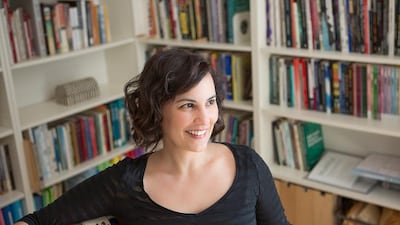Every so often I encounter a book that surpasses expectations and the Kuwaiti writer Mai Al-Nakib's debut collection of short stories The Hidden Light of Objects is the most refreshing arrival on my desk so far this year. The short story has often been overlooked while the novel basks in the limelight, but it is in the short story that authors reveal a subtle flair for perfection, which is certainly the case for Al-Nakib.
Al-Nakib was born in Kuwait and studied English at Brown University in the United States. She now teaches at Kuwait University. The Hidden Light of Objects is her literary debut and offers a hugely gratifying as well as thought-provoking experience.
Al-Nakib’s skilfully crafted collection has been largely derived from her life growing up in the Middle East. The vignettes that precede each of the 10 stories demonstrate her understanding of the confusion of Middle Eastern youth: “We don’t take enough, the arrogance of youth, and now look at us in our corner of the world, shattered in shards. Once there was still mischief to be had and we were safe as crystal dreams.”
The collection attempts to redefine some of the complexities created by such events as the Iraqi invasion of Kuwait, the US occupation of Iraq and the Israeli-Palestinian conflict, all of which feature in her stories. These major political events afflicted her generation and have consequently been the source of her creativity.
In this collection of beautifully eloquent stories, Al-Nakib draws from her own upbringing and experiences in both the Middle East and the West. The stories evolve as a series of remarkable portraits: of a naive Palestinian teenager unable to evade becoming a suicide bomber in Playing With Bombs or, in the title story, of a Kuwaiti mother who has just returned to her family after 10 years of captivity in Iraq. As she wanders around her house, looking at all the objects that once had surrounded her life, her daughters see in her a reflection of their own confusion: “To her, they must be both familiar and unfamiliar. Maybe their familiarity makes her afraid, makes her recognise what she, like us, has taught herself not to see over those ten years. To survive.”
The stories also follow a trajectory: childhood memories of a young girl’s parents and sister on a trip to Japan in Chinese Apples are followed by the misperception of youth in a war-torn Middle East in stories such as Playing With Bombs and Elephant Stamp. Some of her later stories also allude to middle-aged disillusionment, as in Her Straw Hat: “She wanted out of the trap of Kuwait, the burden of its rights and wrongs. That place – the broken Middle East – often felt foreign to her, an uncomfortable elsewhere.”
A sympathetic coherence characterises The Hidden Light of Objects and even the most ingenuous characters, mostly children and teenagers, exhibit a subtle intricacy. For example, in the opening story of the collection, Al-Nakib competently portrays the growing curiosity of a young girl who finds herself collecting objects, around each of which she spins a yarn: “Most people’s stories are hidden away. Objects may provide the only chance – unlikely, impossible though it may be – to unravel kept secrets.” Indeed, objects play a vital part, often reappearing in later stories, drawing the delicate string of the narrative together.
Some of Al-Nakib’s most prevailing images are her descriptions of the cities in the Middle East, before and after the conflicts of oil and war: “There is no going back. I should have realised this after the occupation, the so-called liberation. Nothing, not a thing, went back to the way it had been.”
In Elephant Stamp, a young couple leave their native village to make their lives in 1960s Beirut. Al-Nakib’s remarkable description of a lost city is inspired: “The only way to describe 1965 Beirut is to picture a putty-washed Technicolor postcard of a sequinned sea in a tangerine light. It felt like discovering a private cache of someone’s love letters or learning it was possible to live forever. Beirut was the overwhelming desire to lick a lover’s wrists, the eternal yearning for a first kiss.”
With her compassion for an old, vanished world and her exceptional eye for the bruised landscape of the modern Middle East, Al-Nakib should be heralded as an exciting new literary voice.
Erika Banerji has written for The Statesman, The Times of India, The Observer and Wasafiri. Her short fiction has appeared in several literary journals. She lives in London.

